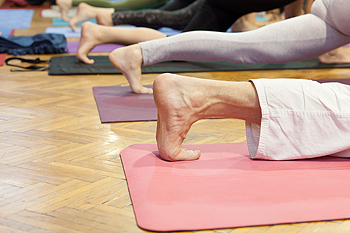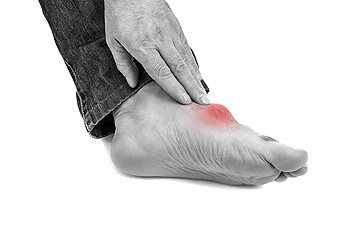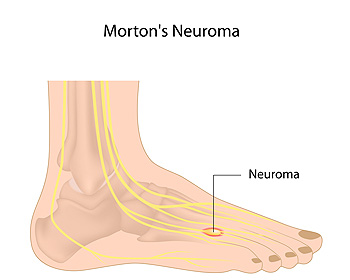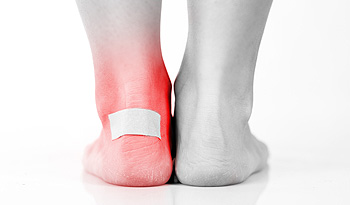Connect With Us
Blog
Items filtered by date: August 2020
Why Are Foot Exercises Important?
 Exercising the feet may seem trivial, but in reality, it is very important. The feet are the foundation upon which the entire body stands, and they support your weight all day, allowing you to be mobile and complete your daily activities. Practicing foot exercises can keep your feet strong and flexible, which can reduce foot and ankle pain, decrease muscle soreness, prevent injuries, and keep you healthy and active. You may want to choose a foot exercise regime that focuses on increasing your range of motion, improving your flexibility, and strengthening the muscles of the feet. If you have existing foot pain, an injury, arthritis, diabetes, or any other foot condition, it is suggested that you speak with a podiatrist prior to starting an exercise program.
Exercising the feet may seem trivial, but in reality, it is very important. The feet are the foundation upon which the entire body stands, and they support your weight all day, allowing you to be mobile and complete your daily activities. Practicing foot exercises can keep your feet strong and flexible, which can reduce foot and ankle pain, decrease muscle soreness, prevent injuries, and keep you healthy and active. You may want to choose a foot exercise regime that focuses on increasing your range of motion, improving your flexibility, and strengthening the muscles of the feet. If you have existing foot pain, an injury, arthritis, diabetes, or any other foot condition, it is suggested that you speak with a podiatrist prior to starting an exercise program.
Exercising your feet regularly with the proper foot wear is a great way to prevent injuries and build strength. If you have any concerns about your feet, contact Dr. David Ungar from Personal Foot Care. Our doctor can provide the care you need to keep you pain-free and on your feet.
Exercise for Your Feet
Exercise for your feet can help you gain strength, mobility and flexibility in your feet. They say that strengthening your feet can be just as rewarding as strengthening another part of the body. Your feet are very important, and we often forget about them in our daily tasks. But it is because of our feet that are we able to get going and do what we need to. For those of us fortunate enough to not have any foot problems, it is an important gesture to take care of them to ensure good health in the long run.
Some foot health exercises can include ankle pumps, tip-toeing, toe rises, lifting off the floor doing reps and sets, and flexing the toes. It is best to speak with Our doctor to determine an appropriate regimen for your needs. Everyone’s needs and bodies are different, and the activities required to maintain strength in the feet vary from individual to individual.
Once you get into a routine of doing regular exercise, you may notice a difference in your feet and how strong they may become.
If you have any questions please feel free to contact our office located in Farmington, MI . We offer the newest diagnostic and treatment technologies for all your foot and ankle needs.
The Location of the Achilles Tendon
 The portion of tissue that is known as the Achilles tendon is located in the back of the leg, and connects the heel to the calf muscles. If an injury occurs to this part of the foot, it is often accompanied by severe pain and discomfort. An injury can happen for several reasons, including wearing shoes that do not fit correctly, suddenly twisting the foot while abruptly changing direction, and pursuing running activities without properly warming up or cooling down. A common symptom can include pain that is felt in the heel and back of the leg upon arising in the morning, and it may swell as the day progresses. Mild relief may be found when the activity that caused the injury is stopped, and it may help to wear custom made orthotics. If you have endured an Achilles tendon injury, it is strongly advised that you consult with a podiatrist who can properly diagnose and treat this condition.
The portion of tissue that is known as the Achilles tendon is located in the back of the leg, and connects the heel to the calf muscles. If an injury occurs to this part of the foot, it is often accompanied by severe pain and discomfort. An injury can happen for several reasons, including wearing shoes that do not fit correctly, suddenly twisting the foot while abruptly changing direction, and pursuing running activities without properly warming up or cooling down. A common symptom can include pain that is felt in the heel and back of the leg upon arising in the morning, and it may swell as the day progresses. Mild relief may be found when the activity that caused the injury is stopped, and it may help to wear custom made orthotics. If you have endured an Achilles tendon injury, it is strongly advised that you consult with a podiatrist who can properly diagnose and treat this condition.
Achilles tendon injuries need immediate attention to avoid future complications. If you have any concerns, contact Dr. David Ungar of Personal Foot Care. Our doctor can provide the care you need to keep you pain-free and on your feet.
What Is the Achilles Tendon?
The Achilles tendon is a tendon that connects the lower leg muscles and calf to the heel of the foot. It is the strongest tendon in the human body and is essential for making movement possible. Because this tendon is such an integral part of the body, any injuries to it can create immense difficulties and should immediately be presented to a doctor.
What Are the Symptoms of an Achilles Tendon Injury?
There are various types of injuries that can affect the Achilles tendon. The two most common injuries are Achilles tendinitis and ruptures of the tendon.
Achilles Tendinitis Symptoms
- Inflammation
- Dull to severe pain
- Increased blood flow to the tendon
- Thickening of the tendon
Rupture Symptoms
- Extreme pain and swelling in the foot
- Total immobility
Treatment and Prevention
Achilles tendon injuries are diagnosed by a thorough physical evaluation, which can include an MRI. Treatment involves rest, physical therapy, and in some cases, surgery. However, various preventative measures can be taken to avoid these injuries, such as:
- Thorough stretching of the tendon before and after exercise
- Strengthening exercises like calf raises, squats, leg curls, leg extensions, leg raises, lunges, and leg presses
If you have any questions please feel free to contact our office located in Farmington, MI . We offer the newest diagnostic tools and technology to treat your foot and ankle needs.
Do Your Child's Feet Hurt?
What to Eat to Help Manage Gout
 Gout is a type of arthritis that causes sudden pain, swelling and inflammation of the joints, typically in the big toes. Gout attacks are caused by a buildup of uric acid in the bloodstream. Fortunately, you may be able to minimize the occurrence of gout attacks by altering your diet. To lower the levels of uric acid in your blood, it is recommended that you avoid consuming organ meats, game meats, fish and other seafoods, foods that contain added sugars or yeasts, and sweet beverages such as fruit juices and soda. Foods that are safer for people who suffer from gout include fruits, vegetables, legumes, nuts and seeds, whole grains, low-fat dairy, eggs, coffee, tea, herbs, spices, and plant-based oils. For more information about gout, and for treatment and prevention options, consult with a podiatrist today.
Gout is a type of arthritis that causes sudden pain, swelling and inflammation of the joints, typically in the big toes. Gout attacks are caused by a buildup of uric acid in the bloodstream. Fortunately, you may be able to minimize the occurrence of gout attacks by altering your diet. To lower the levels of uric acid in your blood, it is recommended that you avoid consuming organ meats, game meats, fish and other seafoods, foods that contain added sugars or yeasts, and sweet beverages such as fruit juices and soda. Foods that are safer for people who suffer from gout include fruits, vegetables, legumes, nuts and seeds, whole grains, low-fat dairy, eggs, coffee, tea, herbs, spices, and plant-based oils. For more information about gout, and for treatment and prevention options, consult with a podiatrist today.
Gout is a foot condition that requires certain treatment and care. If you are seeking treatment, contact Dr. David Ungar from Personal Foot Care. Our doctor will treat your foot and ankle needs.
What Is Gout?
Gout is a type of arthritis caused by a buildup of uric acid in the bloodstream. It often develops in the foot, especially the big toe area, although it can manifest in other parts of the body as well. Gout can make walking and standing very painful and is especially common in diabetics and the obese.
People typically get gout because of a poor diet. Genetic predisposition is also a factor. The children of parents who have had gout frequently have a chance of developing it themselves.
Gout can easily be identified by redness and inflammation of the big toe and the surrounding areas of the foot. Other symptoms include extreme fatigue, joint pain, and running high fevers. Sometimes corticosteroid drugs can be prescribed to treat gout, but the best way to combat this disease is to get more exercise and eat a better diet.
If you have any questions please feel free to contact our office located in Farmington, MI . We offer the newest diagnostic and treatment technologies for all your foot and ankle needs.
How Does Morton's Neuroma Feel?
 Morton’s neuroma is a condition which causes swelling along a nerve in the foot. The affected nerve is typically between the third and fourth toes, or the second and third toes. The symptoms of this condition include tingling, burning, numbness, pain, and the sensation that you are stepping on something inside your shoe. Symptoms typically begin gradually, often while wearing narrow shoes or performing certain physical activities, and go away with rest. However, as the condition progresses, the symptoms may worsen and persist for days or even weeks as the swelling along the nerve enlarges. If you are experiencing the symptoms of Morton’s neuroma, it is recommended that you seek the care of a podiatrist.
Morton’s neuroma is a condition which causes swelling along a nerve in the foot. The affected nerve is typically between the third and fourth toes, or the second and third toes. The symptoms of this condition include tingling, burning, numbness, pain, and the sensation that you are stepping on something inside your shoe. Symptoms typically begin gradually, often while wearing narrow shoes or performing certain physical activities, and go away with rest. However, as the condition progresses, the symptoms may worsen and persist for days or even weeks as the swelling along the nerve enlarges. If you are experiencing the symptoms of Morton’s neuroma, it is recommended that you seek the care of a podiatrist.
Morton’s neuroma is a very uncomfortable condition to live with. If you think you have Morton’s neuroma, contact Dr. David Ungar of Personal Foot Care. Our doctor will attend to all of your foot care needs and answer any of your related questions.
Morton’s Neuroma
Morton's neuroma is a painful foot condition that commonly affects the areas between the second and third or third and fourth toe, although other areas of the foot are also susceptible. Morton’s neuroma is caused by an inflamed nerve in the foot that is being squeezed and aggravated by surrounding bones.
What Increases the Chances of Having Morton’s Neuroma?
- Ill-fitting high heels or shoes that add pressure to the toe or foot
- Jogging, running or any sport that involves constant impact to the foot
- Flat feet, bunions, and any other foot deformities
Morton’s neuroma is a very treatable condition. Orthotics and shoe inserts can often be used to alleviate the pain on the forefront of the feet. In more severe cases, corticosteroids can also be prescribed. In order to figure out the best treatment for your neuroma, it’s recommended to seek the care of a podiatrist who can diagnose your condition and provide different treatment options.
If you have any questions, please feel free to contact our office located in Farmington, MI . We offer the newest diagnostic and treatment technologies for all your foot care needs.
Blisters on the Feet Can Protect Damaged Skin
 People who often get blisters on the feet are aware of the discomfort they may cause. Blisters are a small area that can resemble a bubble that forms over the damaged skin. This is filled with fluid that protects the raw skin, and will gradually drain when the healing process is completed. There are several reasons why blisters on the feet can develop, including wearing shoes that do not fit properly, excessive sweating that may come from wearing shoes that are made of non-breathable materials, or from not wearing socks. Research has indicated that it may be beneficial to moisturize the feet prior to wearing shoes. This may help prevent existing blisters from becoming worse. If you get frequent blisters on the feet, it is suggested that you consult with a podiatrist who can guide you toward effective prevention and treatment techniques.
People who often get blisters on the feet are aware of the discomfort they may cause. Blisters are a small area that can resemble a bubble that forms over the damaged skin. This is filled with fluid that protects the raw skin, and will gradually drain when the healing process is completed. There are several reasons why blisters on the feet can develop, including wearing shoes that do not fit properly, excessive sweating that may come from wearing shoes that are made of non-breathable materials, or from not wearing socks. Research has indicated that it may be beneficial to moisturize the feet prior to wearing shoes. This may help prevent existing blisters from becoming worse. If you get frequent blisters on the feet, it is suggested that you consult with a podiatrist who can guide you toward effective prevention and treatment techniques.
Blisters are prone to making everyday activities extremely uncomfortable. If your feet are hurting, contact Dr. David Ungar of Personal Foot Care. Our doctor can provide the care you need to keep you pain-free and on your feet.
Foot Blisters
Foot blisters develop as a result of constantly wearing tight or ill-fitting footwear. This happens due to the constant rubbing from the shoe, which can often lead to pain.
What Are Foot Blisters?
A foot blister is a small fluid-filled pocket that forms on the upper-most layer of the skin. Blisters are filled with clear fluid and can lead to blood drainage or pus if the area becomes infected.
How Do Blisters Form?
Blisters on the feet are often the result of constant friction of skin and material, usually by shoe rubbing. Walking in sandals, boots, or shoes that don’t fit properly for long periods of time can result in a blister. Having consistent foot moisture and humidity can easily lead to blister formation.
Prevention & Treatment
It is important to properly care for the affected area in order to prevent infection and ease the pain. Do not lance the blister and use a Band-Aid to provide pain relief. Also, be sure to keep your feet dry and wear proper fitting shoes. If you see blood or pus in a blister, seek assistance from a podiatrist.
If you have any questions, please feel free to contact our office located in Farmington, MI . We offer the newest diagnostic and treatment technologies for all your foot care needs.


